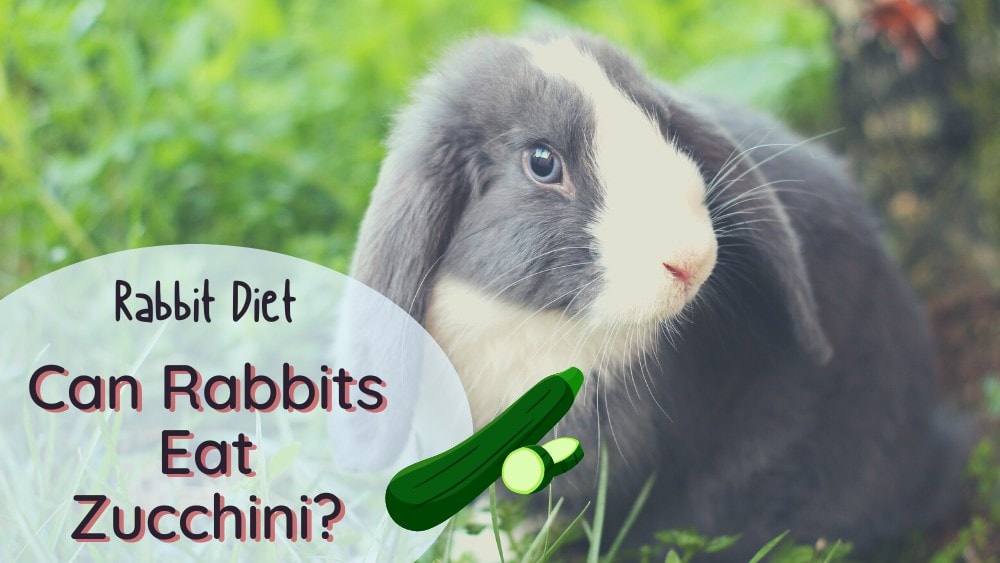Zucchini is the most popular vegetable at my house. My rabbits love it. My son has single-handedly eaten a whole zucchini almost eavery day since he was three years old. Since I hope there will be some left over for the rest of the family now and then, I devote a big section of my garden to growing this summer squash. Growing zucchini plants feels like a great use of space because nearly every part of the plant is edible for humans and bunnies.
Can Rabbits Eat Zucchini or Courgette?
Yes! Rabbits can eat zucchini! They enjoy munching on the long green fruit with the skin on. The seeds inside are safe to eat, too. Rabbits can eat zucchini plant leaves (as long as they haven’t mildewed) and yellow blossoms. Always feed zucchini and other squashes to your rabbit raw, not cooked.
What is zucchini? It’s a member of the squash family, Cucurbita. It’s a summer squash, usually harvested when the rind is still soft. It’s known by different terms in different parts of the world. Zucchini, courgette, cocozelle, and baby marrow are its most common names. Home gardeners grow a wide variety of zucchini or similar summer squash plants.
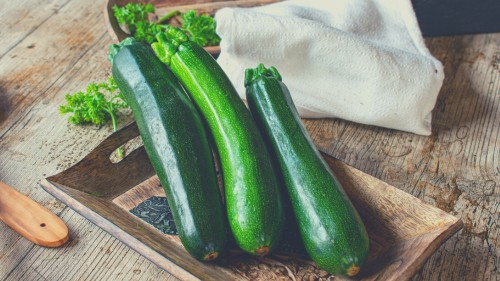
Is Zucchini Good for Rabbits?
All summer squash that humans can eat – like zucchini and yellow crookneck squash – are edible for rabbits. But rabbits and humans have extraordinarily different nutritional needs.
Humans are omnivores. But rabbits are strict herbivores and need to consume huge amounts of roughage to keep their complex digestive systems running round-the-clock.
A healthy rabbit’s diet should be between 22% and 28% fiber! They cannot meet this quota unless they are eating mostly dried grass hay.
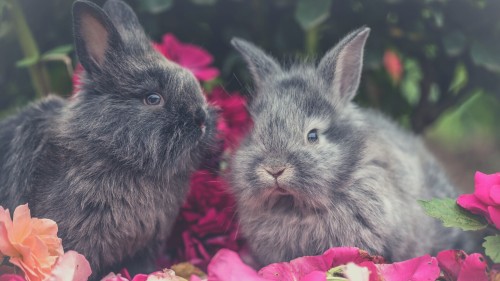
Zucchini is good for rabbits because it brings variety to their diets without adding a lot of sugar. It has beneficial vitamins and minerals, which we’ll look at below. But zucchini has only a moderate fiber content, so it shouldn’t have as large a place in a healthy rabbit’s diet as it could in a human’s.
Nutritional Benefits of Zucchini
Like their relatives, cucumbers, zucchinis are mostly water – 95% in fact! The non-water portion of zucchini is made of carbohydrates (including fiber) and a smidge of protein.
Macronutrients in Zucchini:
- 3% carbohydrate
- 1% fiber
- 2% sugar
- 0.3% fat
- 1.2% protein
Zucchini doesn’t provide much fiber, protein, or fat. It does supply some excellent vitamins, minerals, and other bioactive plant compounds that may be lacking in a hay-based diet. Since rabbits are used for research experiments by human health labs, the effects of many compounds found in zucchini have been specifically studied in rabbits. These include:
- Beta Carotene – found to improve fertility in rabbits.
- Lutein – found to prevent vision damage and improve growth rate.
- Manganese – found to improve growth and development in rex rabbits.
- Vitamin B6 – many benefits. In one study, rabbits deficient in vitamin B6 died in 100 days.
- Potassium – prevents muscle dystrophy in rabbits, amongst a host of other benefits.
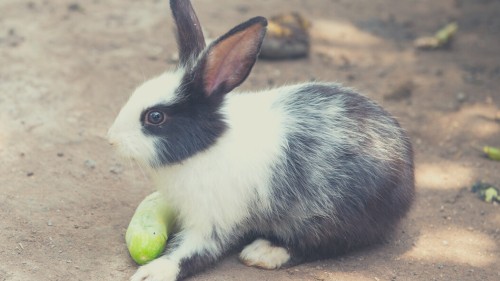
In Traditional Chinese Medicine (TCM), zucchini is known for its ability to “clear heat” from the body. Veterinarians are just starting to study TCM and acupuncture for rabbits!
Should Rabbits Eat Zucchini Cooked or Raw?
Rabbits should eat all their veggies raw, including zucchini and other squash. Rabbits don’t like the texture of cooked food.
Cooking vegetables decreases the vitamin content in some cases (though it makes it more available in others). The biggest reason why rabbits shouldn’t eat cooked zucchini is that it’s usually prepared with oil, salt, or spices that are not appropriate for rabbits. Bunnies need very low-fat diets. Only 3% of their total calorie intake should be from fat.
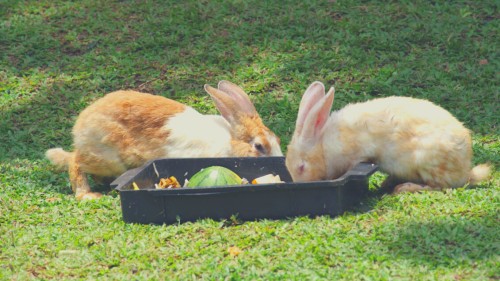
Can Rabbits Eat Overgrown Zucchini?
If you’ve grown your own zucchini, you know the joke. You walk away for 10 minutes and your baby zucchinis transformed into 18-inch-long “torpedoes!” Most people use these huge overgrown squash for baking projects. But when you and your neighbors have had enough of the zucchini bread, can you feed overgrown zucchini to the rabbits?
Yes, rabbits can eat overgrown zucchini and will be happy to do so. Just don’t expect one bunny to clean up the whole thing! Introduce zucchini slowly to your rabbits, like you would any other treat.
Watch them for a few days to see if they have any watery stool or gas before giving them more. Don’t feed them so much zucchini that they fill their stomachs with water and don’t get the fiber they need from hay.
Also, this probably goes without saying, but don’t feed rabbits zucchini bread or other baked goods.
Can Rabbits Eat Zucchini Skin and Seeds?
There’s no need to peel zucchini before giving it to bunnies. Rabbits can eat zucchini skin. The skin contains more fiber than the flesh and lots of rich nutrients.
Zucchini you buy at the store rarely grow long enough to develop seeds, but giant homegrown summer squashes have plenty of them.
You don’t need to remove the seeds before you give them to your rabbits. In fact, this study by the International Journal of Molecular Sciences and a project by the Sustainable Agriculture Research and Education group suggest that squash seeds have anti-parasitic benefits in livestock.
Can Rabbits Eat Zucchini Plant Leaves?
Yes! Rabbits can eat the leaves of your zucchini and squash plants. Zucchini leaves contain nearly the whole alphabet of vitamins and are a great source of iron, zinc, magnesium, and other minerals. As long as you introduce them slowly, rabbits can eat clean leaves you prune from your zucchini plants.
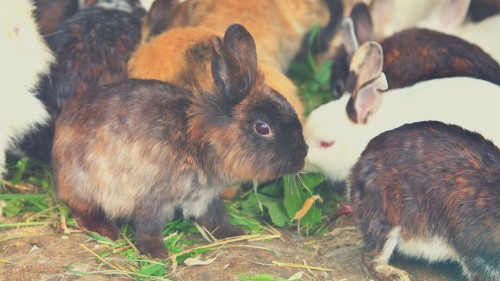
I specify “clean” leaves because zucchini tends to develop white powdery mildew on the leaves late in the growing season. It’s almost impossible to avoid this mildew in late summer, but you should never ever feed molding or mildewed vegetation to rabbits.
Do not feed them leaves that have been sprayed with pesticides or herbicides, even “organic” or “natural” ones like neem oil.
Can Rabbits Eat Zucchini Flowers or Squash Blossoms?
Yes to this, too! Squash blossoms are regarded as a treat in many cultures. (I’ve had tempura squash blossoms in Japan!) So – while a rabbit should never have them battered and fried – they are completely edible and delicious. Rabbits can eat both the male and female specimens of these golden yellow, trumpet-shaped blossoms.
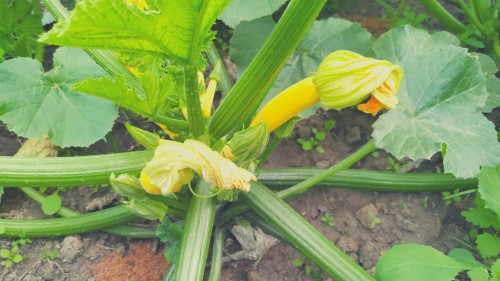
Can Baby Rabbits Eat Zucchini?
Baby rabbits have extra-sensitive digestive tracts. It’s tough for a bunny’s tummy to transition from milk to eating solid food! If you dilute the fiber in a baby rabbit’s diet with lots of water or watery vegetables, they could develop diarrhea.
Don’t feed treats or sugary or watery veggies to rabbits under 3-4 months of age.
Once you’ve established a healthy, hay-based diet for your rabbit, zucchini is a good vegetable to introduce. Its low starch content won’t spike your rabbit’s blood sugar or cultivate its sweet tooth and spoil it for healthy food.
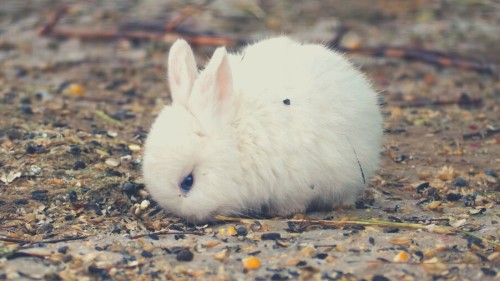
Risks of Feeding Zucchini to Rabbits
There are very few risks to feeding zucchini to rabbits. The worst thing that could happen is that your bunny would overeat zucchini and miss a regular meal of hay. (This isn’t to be taken lightly in rabbits, though. They cannot fast for long periods or go without constant fiber, like carnivores or omnivores!)
Rabbits are in touch with their instincts and usually won’t eat much more zucchini than they ought to have. But you should limit it to 2-4 slices per day mixed in with their other vegetables, just to be safe.
Can Rabbits Eat Other Summer Squash or Winter Squash?
Yes, rabbits can eat other edible members of the Cucurbita vegetable family, including cucumbers, yellow squash, pumpkin, acorn squash, and butternut squash.
Do not feed your rabbits ornamental gourds that are grown for decoration, not consumption. In most cases, they are probably harmless. But they could contain bitter compounds that could kill your rabbit.
Toxic Squash Syndrome
Toxic Squash Syndrome. It sounds like something out of an absurdist nightmare, but it’s a real thing. Cucurbit poisoning, also known as Toxic Squash Syndrome (TSS), happens when a person or animal eats a squash that has a high amount of cucurbitacins. Wild squash plants produce these poisonous compounds to discourage predators from eating them. Even a bite or two of a squash containing cucurbitacins can cause severe stomach pain and hair loss.
Don’t freak out, though. Cucurbitacins have been (almost) entirely bred out of domestic squash varieties like zucchini raised for human consumption. You only need to be cautious about squash or melon that is intended for ornamental purposes and not to be eaten (though even most of those are probably safe) or unrecognized squash growing in your garden that could have hybridized with wild squash.
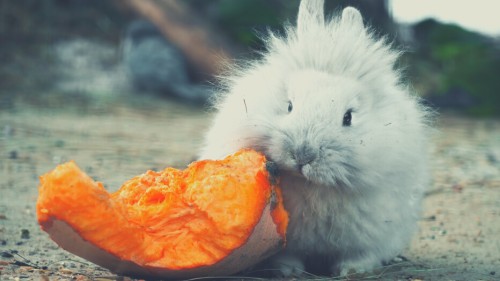
The good news is any squash or melon that has dangerous levels of cucurbitacins will taste extremely bitter. So, if hearing about TSS makes you suddenly suspicious of all squash – as it did for me – all you have to do is touch the tip of your tongue to a slice of zucchini to see if it’s safe.
How to Prepare Zucchini for Rabbits
- Source good-quality zucchini that are fresh and haven’t been sprayed with pesticides or herbicides. Don’t use any fruits with squishy or moldy spots.
- Wash the zucchini by scrubbing it under warm running water. Do not use soap, as it leaves residues on produce.
- Don’t peel zucchini for rabbits. Just slice it and mix it in with your bunny’s daily veggies.
How Much Zucchini Can Rabbits Eat?
Most veterinarians recommend that rabbits eat between one and two cups of fresh vegetables every day. This should be mostly leafy herbs and veggies like kale, cilantro, and squash leaves. You can mix in a small amount of higher-carb vegetables like squash or carrots.
Zucchini is very low carbohydrates compared to other squash like butternut. (Zucchini is 3% carbs and butternut squash is 16% carbs.) So you can give your rabbit more zucchini than other squashes. 2-4 slices of zucchini per day is appropriate for most rabbits.
The first time you give zucchini to your rabbit, give it a small 1” square to make sure it doesn’t upset your bunny’s gut. You can slowly increase the amount of zucchini you offer.
Final Thoughts
Rabbits are cautious about trying new foods. They may take a while to discover that they like zucchini. When introducing a new food, leave it in your bunny’s bowl for several hours to give them a chance to try it. Remove uneaten vegetables after 6-8 hours so they won’t mold. But even if your rabbit didn’t eat zucchini the first time, you can try again with a new piece.
Zucchini is low in sugar, so rabbits may not devour it with the enthusiasm they have for pumpkins or pineapples. But they can safely enjoy more zucchini at a time, making it a great snack for bunnies.
Did you know that so much of the zucchini plant was edible? What parts do your rabbits enjoy? We’d love to learn from your experience!


